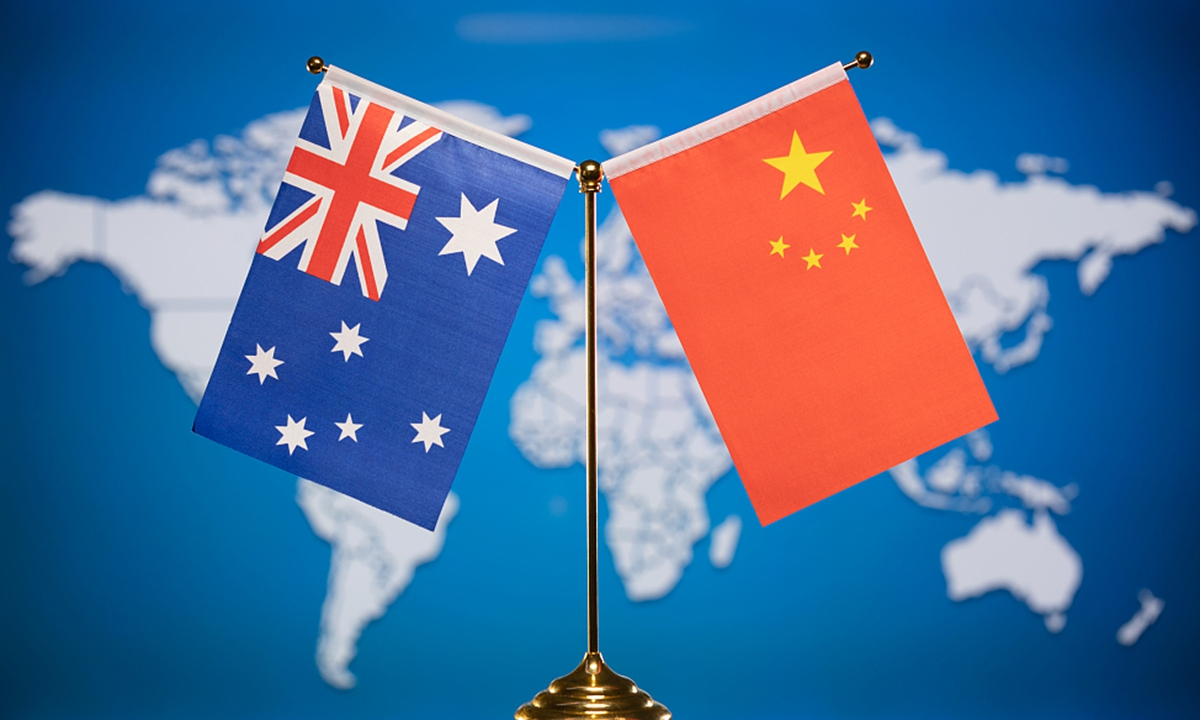
China Australia Photo: VCG
New Australian Prime Minister Anthony Albanese on Tuesday urged China to remove the so-called trade barriers against Australian goods when attending a summit of Quad in Tokyo, Reuters reported.
"It's China that has applied sanctions on Australia. There is no justification for doing that. And that's why they should be removed," he said.
It is not surprising to see the new prime minister repeat some cliché accusations against China when it comes to the bilateral trade issues. After all, he was just sworn in and might have not had the chance to review the current trade issues. Therefore, it must be pointed out that to break the ice in trade tensions between China and Australia, the ball is in Australia's court. It was the Australian federal government that discriminated against Chinese firms and investments and torn apart economic agreements - on top of the tremendous political hostility. China has never announced any economic retaliation or "sanctions" against Australia.
Currently, observers generally believe that while it remains to be seen whether Albanese and his team will restore rationality to their China policy, the new government at least provides an opportunity for the China-Australia relationship to see some improvement. And from the perspective of both its own national interest and its current economic situation, Canberra needs to value this hard-won opportunity.
China has long been Australia's largest trading partner, largest export market and largest source of imports. Even as the China-Australia relationship has been down to a deep freeze since 2020, bilateral trade still accounted for the largest share in Australia's total trade over the past two years. In 2021, Australia exports to China hit $133 billion.
Had Canberra, led by former Prime Minister Scott Morrison, not made erroneous remarks and deeds on issues concerning China's core interests and internal affairs, and not gone further down the road of politicizing trade and investment issues by frequently suppressing Chinese companies on grounds of national security, then the Australian economy would have reaped dividends from bilateral trade far beyond its current level.
Due to the geographical distance, there is no territorial or historical conflict between China and Australia. All the so-called national security problems are nothing but imagination by some politicians. But regrettably, the former Morrison government has been keen to serve as an "anti-China vanguard" to show its loyalty and commitment to strengthen the US-Australia alliance, with little regard for its economic ties with China.
In fact, Australia's hostility toward China has always been in the shadow of the US' geopolitical games. For a long time, the US has shown a strong willingness to politicize trade activities, which inevitably affected Australia, contributing to the latter's trade difficulties with China.
If the new Australian government has the willingness to change the situation, they need to find ways to turn a new page for its relationship with China. Of course, given that Australia is one of the US' closest allies, that change may not be easy to come.
But if the new government still wants to make a difference economically, they need to stop politicizing trade activities as the US does to show its sincerity to cooperate with China, at least on the trade front. For instance, they need to grant Chinese high-tech companies like Huawei fair treatment instead of shutting them out citing baseless national security reasons.
If Canberra wants to change course with China, there is actually no short of cooperation opportunities for both countries. The Regional Comprehensive Economic Partnership (RCEP), which took effect at the beginning of this year, is supposed to bring more resilient regional supply chains and more export opportunities for countries within the trade bloc.
Moreover, both countries have set ambitious targets for tackling climate change, which could open a new front for cooperation. China will aim to hit peak emissions before 2030 and for carbon neutrality by 2060, while Albanese pledged to set an emissions reduction target of 43 percent by 2030 and boost the share of renewables in the national electricity market to 82 percent.
All in all, we hope that the new government could reduce hostility and show sincerity in its China policy to at least ease tensions for bilateral trade so as to promote trade relations with China in a pragmatic manner. Baselessly accusing China of economic "sanctions" is not a positive first step.




